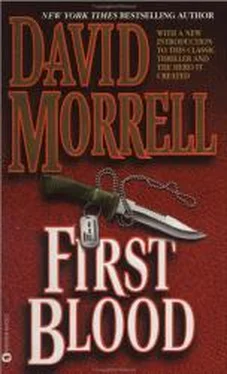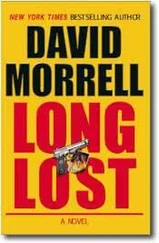David Morrell
First blood
In the summer of 1968, I was 25, a graduate student at Penn State University. Specializing in American literature, I'd finished my M.A. thesis on Ernest Hemingway and was starting my doctoral dissertation on John Earth. But in my heart, what I wanted to be was a novelist.
I knew that few novelists made a living at it, so I'd decided to become a literature professor, an occupation in which I'd be surrounded by books and allowed time to write. A Penn State faculty member, Philip Klass, whose science-fiction pseudonym is William Tenn, had given me generous instruction in the techniques of fiction writing. Still, as Klass had pointed out, 'I can teach you how to write but not what to write about.'
What would I write about?
By chance, I watched a television program that changed my life. The program was The CBS Evening News, and on that sultry August evening, Walter Cronkite contrasted two stories whose friction flashed like lightning through my mind.
The first story showed a fire fight in Vietnam. Sweaty American soldiers crouched in the jungle, shooting bursts from M-16s to repel an enemy attack. Incoming bullets kicked up dirt and shredded leaves. Medics scrambled to assist the wounded. An officer barked coordinates into a two-way radio, demanding air support. The fatigue, determination, and fear on the faces of the soldiers were dismayingly vivid.
The second story showed a different sort of battle. That steamy summer, the inner cities of America had erupted into violence. In nightmarish images, National Guardsmen clutched M-16s and stalked along the rubble of burning streets, dodging rocks, wary of snipers among devastated vehicles and gutted buildings.
Each news story, distressing enough on its own, became doubly so when paired with the other. It occurred to me that, if I'd turned down the sound, if I hadn't heard each story's reporter explain what I was watching, I might have thought that both film clips were two aspects of one horror. A fire fight outside Saigon, a riot within it. A riot within an American city, a fire fight outside it. Vietnam and America.
What if? I thought. Those magic words are the seed of all fiction. What if I wrote a book in which the Vietnam war literally came home to America? There hadn't been a war on American soil since the end of the Civil War in 1865. With America splitting apart because of Vietnam, maybe it was time to write a novel that dramatized the philosophical division in our society, that shoved the brutality of war right under our noses.
I decided my catalytic character would be a Vietnam veteran, a Green Beret who, after many harrowing missions, had been captured by the enemy, escaped, and returned home to be given America's highest distinction, the Congressional Medal of Honor. But he would bring something back with him from Southeast Asia, what we now call posttrauma stress syndrome. Haunted by nightmares about what he had done in the war, embittered by civilian indifference and sometimes hostility toward the sacrifice he had made for his country, he would drop out of society to wander the backroads of the nation he loved. He would let his hair grow long, stop shaving, carry his few possessions in a rolled-up sleeping bag slung over his shoulder, and look like what we then called a hippie. In what I loosely thought of as an allegory, he would represent the disaffected.
His name would be… I am asked about his name more than anything else. One of my graduate school languages was French, and on an autumn afternoon, as I read a course assignment, I was struck by the difference between the look and the pronunciation of the name of the author I was reading, Rimbaud. An hour later, my wife came home from buying groceries. She mentioned that she'd bought some apples of a type she'd never heard about before. Rambo. A French author's name and the name of an apple collided, and I recognized the sound of force.
While Rambo represented the disaffected, I needed someone to embody the establishment. Another news report, this time in print, aroused my indignation. In a Southwestern American town, a group of hitchhiking hippies had been picked up by the local police, stripped, hosed, and shaved — not just their beards but their hair. The hippies had then been given back their clothes and driven to a desert road, where they were abandoned to walk to the next town, thirty miles away. I remembered the harassment that my own recently grown mustache and long hair had caused me. 'Why don't you get a haircut? What the hell are you, a man or a woman?' I wondered what Rambo's reaction would be if he were subjected to the insults those hippies had received.
In my novel, the establishment's representative became a police chief, Wilfred Teasle. Wary of stereotypes, I wanted him as complex as the action would allow. I made Teasle old enough to be Rambo's father. That created a generation gap, with the added dimension that Teasle wishes he had a son. Next, I decided that Teasle would be a Korean War hero, his Distinguished Service Cross second only to Rambo's Congressional Medal of Honor. There were many other facets to his character, and in each case, the intention was to make him as motivated and sympathetic as Rambo, because the viewpoints that divided America came from deep, well-meant convictions.
To empathize their polarity, I structured the novel so that a scene from Rambo's perspective would be followed by one from Teasle's, the subsequent scene from Rambo's, the next scene again from Teasle's. That tactic, I hoped, would make the reader identify with each character and at the same time feel ambivalent about them. Who was the hero, who the villain, or were both men heroes, both men villains? The final confrontation between Rambo and Teasle would show that in this microcosmic version of the Vietnam war and American attitudes about it, escalating force results in disaster. Nobody wins.
Due to the rigors of graduate school, I didn't complete First Blood until after I'd graduated from Penn State in 1970 and taught at the University of Iowa for a year. Following the novel's publication in 1972, it was translated into eighteen languages and eventually became the basis for a well-known 1982 film. If you're familiar only with the movie, you'll find a startling surprise at the end of the novel, but the film company changed that conclusion and, as a consequence, was able to produce two Rambo sequels. I wasn't involved with those films. However, I did write a novelization for each of them in an effort to supply the characterization that the latter movies omitted. Not that I object to the movies. They're spectacular in terms of their action. At the same time, I'm aware of the controversy they caused and think it's ironic that a novel about political polarization in America (for and against the Vietnam war) resulted in films that generated similar polarization (for and against Ronald Reagan) a decade after the novel was written.
Sometimes I compare the Rambo books and movies to trains that are similar but headed in different directions. Sometimes I think of Rambo as a son who grew up and out of his father's control. Sometimes I read or hear Rambo's name in a newspaper, a magazine, on the radio, on television — in reference to politicians, financiers, athletes, whomever — used as a noun, an adjective, or a verb, whatever — and it takes me a moment before I remind myself that if not for the CBS Evening News, if not for Rimbaud, my wife, and the name of an apple, if not for Philip Klass and my determination to be a fiction writer, the new edition of the Oxford English Dictionary wouldn't have cited this novel as the source for the creation of a word.
Rambo. Complicated, troubled, indeed haunted, too often misunderstood. If you've heard about him but haven't met him before, he's about to surprise you.
Читать дальше












